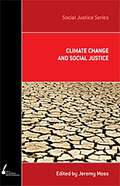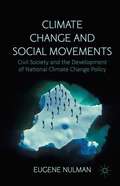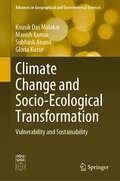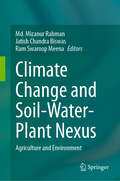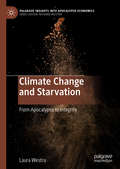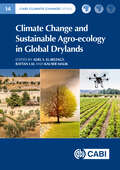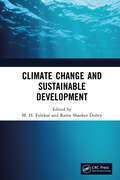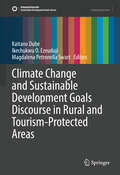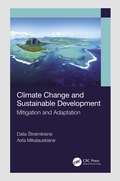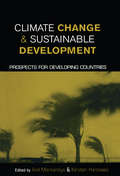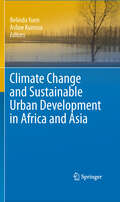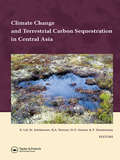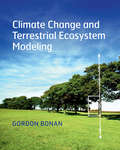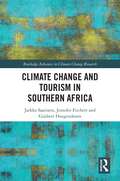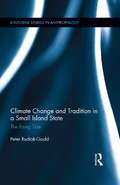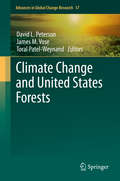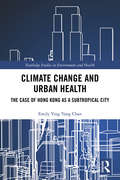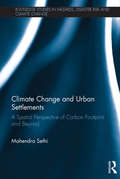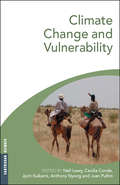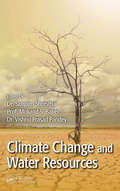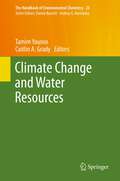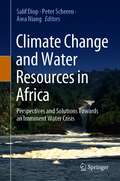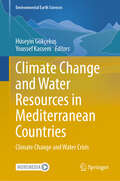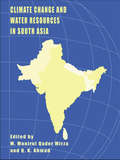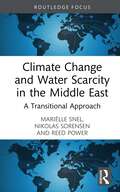- Table View
- List View
Climate Change and Social Justice
by Jeremy MossThe impacts of climate change can already be felt in society and on the Earth itself. As new evidence of the environmental impact of climate change is constantly emerging, we are forced to confront the significance of our political decisions about who will pay the price of responding to a changing climate. In the rush to avoid or reduce the repercussions of climate change, we need to ensure that the burden is evenly distributed or run the risk of creating injustice. Climate Change and Social Justice demonstrates that the problem of how to distribute the costs of climate change is fundamentally a problem of justice. If we ignore the concerns addressed this book, the additional burdens of climate change will fall on the poor and vulnerable. Jeremy Moss brings together today's key thinkers in climate research, including Peter Singer, Ross Garnaut and David Karoly, to respond to these important issues.
Climate Change and Social Movements: Civil Society and the Development of National Climate Change Policy
by Eugene NulmanClimate Change and Social Movements is a riveting and thorough exploration of three important campaigns to influence climate change policy in the United Kingdom. The author delves deep into the campaigns and illuminates the way policymakers think about and respond to social movements.
Climate Change and Socio-Ecological Transformation: Vulnerability and Sustainability (Advances in Geographical and Environmental Sciences)
by Manish Kumar Subhash Anand Kousik Das Malakar Gloria KuzurThis book focuses on various psycho-social and socio-physical aspects of climate change and includes a wide range of case studies. Included topics are notable climate-related social thinking; climate vulnerability; transformation in socio-ecological subsystems; bioclimatological, urban bioclimatological and socio-bioclimatic ideas; disasters; policy instruments; climate justice; human rights; and sustainability. The book distinguishes itself from similar works by including a wide variety of topics and assists policy management in the current and upcoming climate crisis era. This book also addresses the Sustainable Development Goals 13 (Take Urgent Action to Combat Climate Change and Its Impacts), highlighting resilience, recovery potential and adaptive capacity, climate change measures integrated into policies and planning, and knowledge and capacity to mitigate climate change. The ideas covered in this book evolved in response to the current climate crisis, ideas that the authors believe will aid in societal management and development in the present and future. The book is a useful source for planners, geographers, professionals, academics, government officials, laypeople, and others interested in climate change.
Climate Change and Soil-Water-Plant Nexus: Agriculture and Environment
by Ram Swaroop Meena Md. Mizanur Rahman Jatish Chandra BiswasThe edited book provides a comprehensive and up-to-date overview of scientific developments in agricultural sustainability under changing climate conditions. It focuses on the linkages among soil, water, and crops and their management options to maintain soil health and ensure a sustainable crop production environment. The book addresses the scenarios and challenges of agricultural sustainability in the face of climatic change. With increasing pressure on our limited land and water resources to produce higher crop yields for a growing global population, the efficient use of soil, water, and fertilizers is crucial for achieving most of the United Nations' Sustainable Development Goals (SDGs). The book presents climate change mitigation and adaptation options to help achieve these SDGs. It highlights the impact of climate variability on agricultural production and the functions of ecosystems, emphasizing the importance of developing climate-resilient agriculture to sustain food production and reduce greenhouse gas emissions. The book explores the soil-water-plant nexus and its response to changing climate, characterizing seasonal and inter-annual climatic variability in crop growth and yield. Different chapters evaluate the effects of climate change on soil health degradation, depletion of soil nutrients and carbon contents, and crop responses to climate variability. This book is of interest to academicians, researchers, scientists, capacity builders, and policymakers. Extension personnel will benefit from its insights, and it serves as valuable supporting material for graduate students of agriculture, forestry, ecology, soil science, and environmental sciences in understanding and designing their own research.
Climate Change and Starvation: From Apocalypse to Integrity (Palgrave Insights into Apocalypse Economics)
by Laura WestraThere is a lot written on climate change from various points of view, but this is the first work that demonstrates the connection between the hunger of the poor, the deprivation of safe and healthy food on the part of those who can afford it in the wealthy countries, but still face starvation in the sense of lack of nourishment, and climate change itself. It looks at the case law and the jurisdiction of the ICC, and adopts a thorough critical approach. This book is an excellent contribution to the development of the debate on climate change.
Climate Change and Sustainable Agro-ecology in Global Drylands (CABI Climate Change Series #22)
by Rattan Lal Adel S. El-Beltagy Kauser MalikDrylands, a home for nearly 2.5 billion people, are highly vulnerable to anthropogenic climate change, and dryland area may expand to 50% of the Earth's surface by 2100. Climate change may aggravate the prevalence of undernutrition and malnutrition because of adverse effects on quantity and quality of food production in these regions. This book takes a holistic approach to sustainable management of drylands to make agriculture drought-resilient. Eminent scientists from around the world share their knowledge and experiences for adaptation and mitigation of the anthropogenic climate change through innovation in sustainable management of water, soil, crops, livestock, and fisheries. They anticipate that climate change will have major impacts on agro- ecosystems which requires continuous dynamic assessments, globally, regionally, and at the local level where the major action of adaptation would have to occur. The assessment will require international cooperation and national capacity-building. This book emphasizes approaches such as smart and precision agriculture, conservation agriculture, and new innovation and technology as tools for adaptation and mitigation. Several chapters are devoted to the human dimensions and policy considerations with emphasis on enhancing coping and adaptive capacity. This book addresses the picture after COP27, including loss and damage, governance and finance. This book: Examines sustainable management for drylands as a solution to environmental and food security issues. Uses a holistic approach to evaluate sustainable management of drylands. Explains how researchers are translating science into action for greening global drylands. This work will be valuable to students and researchers in agroecology, climate change science and dryland agriculture.
Climate Change and Sustainable Development
by M. H. Fulekar Rama Shanker DubeyClimate Change and Sustainable Development covers the climatic and atmospheric changes, greenhouse gases and their impact on eco-system, biodiversity, water resources, agriculture and food security, human health, extreme weather and environment across two sections. The mitigation and adaptation strategies involving sustainable development is also illustrated including efficient technology, renewable energy, developmental activities control and so forth. Nanotechnology for sustainable development, forest protection, environment, social and economic sustainability and climate change policy planning of international bodies like UNFCC, UNDP, Kyoto protocol is also included. Features: Covers climate change fundamentals and its impact on different ecosystems and natural disasters Describes non-renewable energy aspects like fossil fuel, coal, oil, natural gas and so forth Explores sustainable development in terms of environment, social and economic aspects Includes species diversity and loss, agriculture productivity, water resources scarcity, health and environmental, rise in sea level and coastal area submergence Illustrates scientific hybridization of traditional ecological knowledge for enhancing climate change adaptation This book is aimed at graduate students and researchers in engineering and public policy, engineering management, sustainable engineering, renewable energy engineering, environmental engineering, and sustainability.
Climate Change and Sustainable Development Goals Discourse in Rural and Tourism-Protected Areas (Sustainable Development Goals Series)
by Kaitano Dube Magdalena Petronella Swart Ikechukwu O. EzeudujiDespite its potential to unlock socio-economic benefits in rural and protected areas in a manner that addresses the Sustainable Development Goals (SDG), rural and protected areas tourism is yet to be thoroughly examined by academics, scholars, practitioners, and policymakers. This lack of exploration has undermined the potential benefits associated with tourism development in rural and protected areas. Given the complexity of rural tourism, this contributed volume explores current and future debates on the subject using cases in Southern Africa. The book is useful for various audiences, including tourism academics, planners, cultural and heritage practitioners, and rural development planners. The topics covered include gender, transformation, service delivery, visitor experience, wildlife tourism, and host-community tourism interaction.
Climate Change and Sustainable Development: Mitigation and Adaptation
by Asta Mikalauskiene Dalia ŠtreimikienėClimate Change and Sustainable Development: Mitigation and Adaptation focuses on the link between climate change threats and sustainable development goals. This book analyzes the polices of climate change mitigation and adaptation from an economic point of view by addressing globalization, international trade, and business opportunities and challenges. Based on extended research on energy, transportation, agriculture, and more, the case studies included in this book present business opportunities linked to mitigation and adaptation actions; from European Union greenhouse gas emission trading to climate change adaptation policies in developing countries. It presents a framework for the harmonization of climate and sustainable development policies and their mutual outcomes. Specific features: The first book to address main scientific aspects of climate change mitigation and sustainable development and how to deal with these main challenges in a harmonized way Provides practical examples of policies and business development opportunities linked with climate change mitigation and adaptation Analyses climate change challenges and provides implications for business development and good practice case studies from Europe Discusses issues of climate change at different scales ranging from macro to micro level Highlights the importance of climate change adaptation for developing countries, migration trends, city developments and agriculture As the threat of climate change grows ever more present, resources like this book, that provide and discuss necessary solutions and frameworks for ways to deal with and mitigate that threat become ever more essential. This book is a vital resource for academics, students, and professionals in any field seeking to deal with the threats from climate change, and particularly those relating to environmental and climate sciences, as well as those in political and economic fields.
Climate Change and Sustainable Development: Prospects for Developing Countries
by Anil Markandya Kirsten Halsnaes'Makes a substantial contribution to the practical, effective analysis of climate change mitigation options in developing countries.'Development And Cooperation'The book is an excellent exercise and a good source of detailed information, and a basis for further discussions. Any person interested in this major environmental problem should read it.'International Journal of Environment and Pollution'Markandya and Halsnaes' collection is thoughtfully put together and can be recommended to all the practitioners in the fields of climate change and sustainable development.'The Journal of Energy LiteratureThis text argues that the policies pursued by developing countries will be crucial in determining the progress of climate change. Many are industrializing rapidly and the largest, particularly China and India, could have an impact at least as significant as that of the already industrialized economies - the reason given by President Bush for taking the US out of the Kyoto Protocol. The future of sustainable development in large measure depends on developing countries. This book develops a pragmatic framework for evaluating the climate change options faced by each developing country, depending on their individual circumstances. It assesses present methods, suggests how these might be improved, and proposes ways in which social and developmental aspects can be taken into account. Its discussion of the issues and the methods presented contribute to the practical analysis of climate change mitigation options in developing countries. The book should be useful to professionals, governments, international organizations and environmental groups working on climate change issues; as well as researchers, academics and students in economics, environmental and development studies and international affairs.
Climate Change and Sustainable Urban Development in Africa and Asia
by Belinda Yuen Asfaw KumssaThis book is about African and Asian cities. Illustrated through selected case cities, the book brings together a rich collection of papers by leading scholars and practitioners in Africa and Asia to offer empirical analysis and up-to-date discussions and assessments of the urban challenges and solutions for their cities. A number of key topics concerning housing, sustainable urban development and climate change in Africa and Asia are explored along with how policy interventions and partnerships deliver specific forms of urban development. It is intended for all who are interested in the state of the cities and urban development in Africa and Asia. Africa and Asia present, in many ways, useful lessons in dealing with the burgeoning urban population, and the problems surrounding this influx of people and climate change in the developing word.
Climate Change and Terrestrial Carbon Sequestration in Central Asia
by B. A. Stewart R. Lal M. Suleimenov D. O. Hansen P. DoraiswamyThis book brings together current knowledge of terrestrial C sequestration in Central Asia. The themes treated include: biophysical environments, water resources, sustainable agriculture, soil degradation, the effects of irrigation schemes on secondary salinization, soil management and its relationship to carbon dynamics; the relationship between f
Climate Change and Terrestrial Ecosystem Modeling
by Gordon BonanClimate models have evolved into Earth system models with representation of the physics, chemistry, and biology of terrestrial ecosystems. This companion book to Gordon Bonan's Ecological Climatology: Concepts and Applications, Third Edition, builds on the concepts introduced there, and provides the mathematical foundation upon which to develop and understand ecosystem models and their relevance for these Earth system models. The book bridges the disciplinary gap among land surface models developed by atmospheric scientists; biogeochemical models, dynamic global vegetation models, and ecosystem demography models developed by ecologists; and ecohydrology models developed by hydrologists. Review questions, supplemental code, and modeling projects are provided, to aid with understanding how the equations are used. The book is an invaluable guide to climate change and terrestrial ecosystem modeling for graduate students and researchers in climate change, climatology, ecology, hydrology, biogeochemistry, meteorology, environmental science, mathematical modeling, and environmental biophysics.
Climate Change and Tourism in Southern Africa (Routledge Advances in Climate Change Research)
by Jarkko Saarinen Jennifer Fitchett Gijsbert HoogendoornThis book explores the nature of climate change in southern Africa, its impacts on tourism and the resilience, adaptation and governance needs in various tourism operations and environments. Previous studies on climate change and tourism have mainly focused on the Global North and specific forms of tourism such as snow-based winter activities. Drawing on case studies from a wide range of countries including South Africa, Lesotho, Namibia, Botswana and Zimbabwe, this book fills this lacuna by describing and analysing the climate change and tourism nexus in the southern African context. The book begins by providing an overview of the current and estimated impacts of climate change to the tourism industry in the region, highlighting the deepening socio-economic inequities, and environmental and social injustices. It focuses on the importance of sustainable tourism in tackling these issues and highlights that resilience and robust governance and policy systems are essential for a tourism destination to successfully adapt to change. By synthesising the key lessons learned through this analysis, Climate Change and Tourism in Southern Africa also draws attention to specific adaptation and policy strategies which have value for other regions in the Global South. This book will be of great interest to students and scholars of climate change, tourism and environmental policy and justice.
Climate Change and Tradition in a Small Island State: The Rising Tide (Routledge Studies in Anthropology #13)
by Peter Rudiak-GouldThe citizens of the Marshall Islands have been told that climate change will doom their country, and they have seen confirmatory omens in the land, air, and sea. This book investigates how grassroots Marshallese society has interpreted and responded to this threat as intimated by local observation, science communication, and Biblical exegesis. With grounds to dismiss or ignore the threat, Marshall Islanders have instead embraced it; with reasons to forswear guilt and responsibility, they have instead adopted in-group blame; and having been instructed that resettlement is necessary, they have vowed instead to retain the homeland. These dominant local responses can be understood as arising from a pre-existing, vigorous constellation of Marshallese ideas termed "modernity the trickster": a historically inspired narrative of self-inflicted cultural decline and seduction by Euro-American modernity. This study illuminates islander agency at the intersection of the local and the global, and suggests a theory of risk perception based on ideological commitment to narratives of historical progress and decline.
Climate Change and United States Forests (Advances in Global Change Research #57)
by Toral Patel-Weynand David L. Peterson James M. VoseThis volume offers a scientific assessment of the effects of climatic variability and change on forest resources in the United States. Derived from a report that provides technical input to the 2013 U. S. Global Change Research Program National Climate Assessment, the book serves as a framework for managing U. S. forest resources in the context of climate change. The authors focus on topics having the greatest potential to alter the structure and function of forest ecosystems, and therefore ecosystem services, by the end of the 21st century. Part I provides an environmental context for assessing the effects of climate change on forest resources, summarizing changes in environmental stressors, followed by state-of-science projections for future climatic conditions relevant to forest ecosystems. Part II offers a wide-ranging assessment of vulnerability of forest ecosystems and ecosystem services to climate change. The authors anticipate that altered disturbance regimes and stressors will have the biggest effects on forest ecosystems, causing long-term changes in forest conditions. Part III outlines responses to climate change, summarizing current status and trends in forest carbon, effects of carbon management, and carbon mitigation strategies. Adaptation strategies and a proposed framework for risk assessment, including case studies, provide a structured approach for projecting and responding to future changes in resource conditions and ecosystem services. Part IV describes how sustainable forest management, which guides activities on most public and private lands in the United States, can provide an overarching structure for mitigating and adapting to climate change.
Climate Change and Urban Health: The Case of Hong Kong as a Subtropical City (Routledge Studies in Environment and Health)
by Emily Ying ChanThis book provides a theoretical framework and related technical skills for investigating climate change and its public health consequences and responses with a focus on urban settings, and in particular Hong Kong, a subtropical metropolis in Asia. Specifically, the book examines the impact of climate change on health in terms of mortality, hospital admissions and help-seeking, as well as key response strategies of adaptation and mitigation. Many existing books tend to consider the relationship of climate change and public health as two connected issues divided into various discrete topics. Conversely, this book explicitly applies public health concepts to study the human impact of climate change, for example, by conceptualising climate change impact and its alleviation, mitigation and adaptation in a public health framework. Overall, this volume summarises what is known about climate change and health and ignites further debates in the area, especially for urban subtropical communities from within a wider global perspective. This book will be of great interest to students and scholars of environmental health, public health, climate change, urban studies and Asian studies.
Climate Change and Urban Settlements: A Spatial Perspective of Carbon Footprint and Beyond (Routledge Studies in Hazards, Disaster Risk and Climate Change)
by Mahendra SethiClimate change and urbanization are two of the greatest challenges facing humanity in the 21st century, and their effects are converging in dangerous ways. Cities contribute significantly to global warming, and as the world further takes a rural-urban population tilt, the next few decades pose a great challenge in addressing global disparities in the access and allocation of carbon. This book explores the ways in which cities, through their spatial development, contribute to greenhouse gas (GHG) emissions and looks at the ways in which rapidly urbanizing cities in low- and middle-income countries can be planned to reduce overall GHG emissions. The book considers key questions such a: What should be the appropriate economies of scale for cities in a country? What is the most favourable rate of urbanization? What should be the most suitable spatial pattern for a city? And what are appropriate regulatory, economic or governance mechanisms to achieve a low-carbon society? These issues are explored through data analysis of over 156 developing countries and through a specific case study of India. India acts as an interesting example of how societies undergoing rural-to-urban transformations could become green within the planetary boundaries while systematically addressing national and local urban governance. The research concludes with a future pathway that is committed to low-carbon and high-equity spatial development, and will find pertinence to researchers and practitioners alike. This book provides a new tool for policymakers, planners and scholars to rationally and equitably account for global carbon space, prioritize low-carbon strategies for national urbanization and planning individual cities, in addition to recommending an urban governance framework inclusive of green agenda.
Climate Change and Vulnerability (Earthscan Climate Ser.)
by Cecilia Conde Jyoti Kulkarni Neil Leary Anthony Nyong Juan Pulhin�Sound and solid case studies on vulnerability and adaptation have been woefully lacking in the international discourse on climate change. This set of books begins to bridge the gap.� Achim Steiner, UN Under-Secretary General and Executive Director of United Nations Environment Programme �Important reading for students and practitioners alike.� Martin Parry, Co-Chair, Working Group II (Impacts, Adaptation and Vulnerability), Intergovernmental Panel on Climate Change (IPCC) �This book fills an important gap in our understanding ... It is policy-relevant and deserves to be widely read.� Richard Klein, Senior Research Fellow, Stockholm Environment Institute (SEI), Sweden The award of the Nobel Peace Prize for 2007 to the IPCC brings needed attention to the threats from climate change for highly vulnerable regions of the developing world. This authoritative volume (along with its companion covering adaptation) resulting from the work of the Assessments of Impacts and Adaptations to Climate Change (AIACC) project launched with the IPCC in 2002, is the first to provide an in-depth investigation of the stakes in developing countries. It discusses who is vulnerable and the nature and causes of their vulnerability for parts of the world that have been poorly researched till now. It also provides researchers with new examples of applications of vulnerability assessment methods, an approach that is of growing interest in the climate change area but for which there are relatively few applications in the literature. Published with TWAS and START
Climate Change and Water Resources
by Sangam Shrestha Vishnu Prasad Pandey Mukand S. BabelCovering the various aspects of water and climate change, Climate Change and Water Resources presents the principles of climate change science and its effects on earth's water supply. Utilizing the knowledge and expertise from well-known experts in the field, the text provides a broad outline of the many interrelated aspects of climate variations,
Climate Change and Water Resources (The Handbook of Environmental Chemistry #25)
by Tamim Younos Caitlin A. GradyThis volume presents nine chapters prepared by international authors and highlighting various aspects of climate change and water resources. Climate change models and scenarios, particularly those related to precipitation projection, are discussed and uncertainties and data deficiencies that affect the reliability of predictions are identified. The potential impacts of climate change on water resources (including quality) and on crop production are analyzed and adaptation strategies for crop production are offered. Furthermore, case studies of climate change mitigation strategies, such as the reduction of water use and conservation measures in urban environments, are included. This book will serve as a valuable reference work for researchers and students in water and environmental sciences, as well as for governmental agencies and policy makers.
Climate Change and Water Resources in Africa: Perspectives and Solutions Towards an Imminent Water Crisis
by Salif Diop Peter Scheren Awa NiangThe focus of this book is on the key water-related vulnerabilities to climate change in Africa, particularly in its most vulnerable areas, exploring potential management responses to such vulnerabilities. The African countries are particularly exposed and vulnerable to the negative impacts of climate change, with important impacts on water resources and hydrological systems, water availability, water resource management and sea level variations. Already, under various anthropogenic pressures, the status of water resources in Africa has been changing over the past decades, with decreasing water quality, falling groundwater levels, and variability in rainfall, both in terms of timing and intensity. Climate change will further accelerate the rate of change, affecting the ability of people and societies to respond in a timely manner. It is clear that there is no quick fix to the pressures imposed on water resources by climate change. Increasing the resilience of ecosystems and communities to extreme events such as flooding and drought, and integrating climate change risks and opportunities into development decision-making is indeed a key challenge, as much a technical climate-change one, as a political and developmental challenge. The book, in this regard, intends to contribute to the debate around climate change in relation to water resources management in Africa, and in particular inform policy decisions and actions that will improve governments’ and communities’ ability to manage the challenges of climate change and variability in relation to the aquatic ecosystems that they depend on. The knowledge collected in this book will benefit policy makers, researchers, as well as other stakeholders.
Climate Change and Water Resources in Mediterranean Countries: Climate Change and Water Crisis (Environmental Earth Sciences)
by Hüseyin Gökçekuş Youssef KassemThe book provides the opportunity to connect with experts on water treatment techniques, eco-hydrology, hydro-informatics, emerging pollutants in water resources and water management from all over the world. Water is still one of the most significant problems in the world and especially in the Mediterranean region. In this thematic book, all possible approaches and suggestions aimed at finding solutions to overcome water scarcity, better alternatives to treat wastewater and ensuring access to clean water for all communities are valuable subjects that are included for directing authorities to take a step further towards overcoming water-related problems for everyone around the world.
Climate Change and Water Resources in South Asia
by M. Monirul Qader Mirza Q. K. AhmadThis book addresses the most pressing water resource issues in South Asia, particularly in relation to climate change and variability. This is a region characterised by abundant water during the monsoon, when devastating floods occur, and by scarcity of water and droughts during the dry period. These extreme events often cause substantial damage to
Climate Change and Water Scarcity in the Middle East: A Transitional Approach (Earthscan Studies in Water Resource Management)
by Mariëlle Snel Nikolas Sorensen Reed PowerAs water's significance as a geopolitical resource is poised to surpass that of oil, this book explores the adaptation of Water, Sanitation, and Hygiene (WASH) services in the Middle East to climate change challenges, leveraging the Humanitarian-Development-Peace nexus for a sustainable transition and resilient solutions. Delving into the humanitarian and development sectors across the region, the authors advocate for a transformative approach towards more innovative, integrated, and localized programming. It draws a parallel between the increasing global shift in humanitarian needs, as starkly revealed by the COVID-19 pandemic, and the ongoing devastation wrought by climate change, particularly through water-related crises such as flooding, drought, famine, and conflict. The authors stress the urgent need for adaptive and sustainable strategies that can swiftly respond to evolving climate challenges. This book argues that there is currently a window of opportunity for WASH practitioners to develop broader, multi-sectoral experiences to meet these challenges. Drawing on discussions with humanitarian and development practitioners and new contemporary case studies, this book analyzes the financial, institutional, environmental, technical, and socio-cultural considerations for creating sustainable WASH services in transition. The narrative emphasizes the urgent need for a Humanitarian-Development-Peace nexus approach, advocating for multisectoral collaboration and localization as vital to addressing protracted crises and climate change's escalating threats. It calls for a strategic shift towards organizations that merge immediate humanitarian aid with sustainable development, enhancing local capacities for effective, enduring solutions. The authors conclude by outlining practical actions for humanitarian and development organizations at the local, national, regional, and global levels to support effective integrated and transitional WASH programming in the future.
